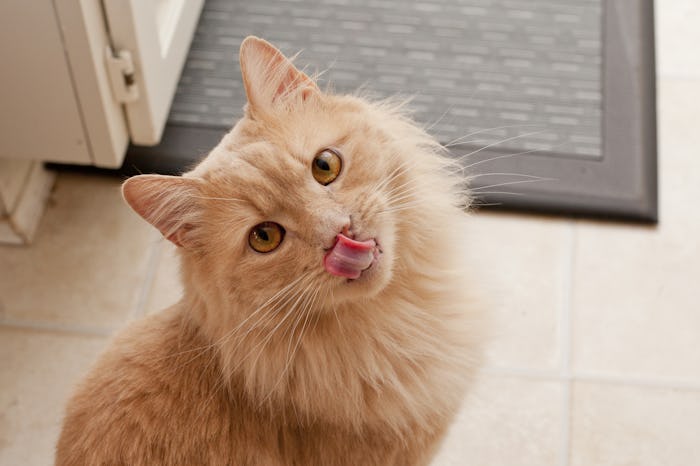We may be in the dog days of summer, but it's important for pet owners to realize that cats feel the heat, too. In fact, one hot-weather danger for cats is dehydration. Just like people, pets need water to stay alive and well, and when the level of fluid in their bodies goes down, they become depleted of the sodium, potassium, and other electrolytes they need.
Because cats have that air of "I can take care of myself, thanks," an owner may not notice right away if their pet isn't feeling well. But as the veterinarian-run website askthecatdoctor.com pointed out, cats can develop many of the same illnesses that affect their human companions — diabetes, pancreatitis, urinary tract infections, heart and kidney disease — in addition to cat-specific ailments such as heartworm and feline leukemia.
"Any cat can be prone to dehydration, but obviously those with with certain conditions — diabetes, hyperthyroidism, cancer — are more at risk," Jodi Holcomb Oliver, DVM, a Maryland-based vet, tells Romper. "Excessive heat and lack of fresh access to fresh water can cause it, as can vomiting and diarrhea." Kittens and elderly cats are especially vulnerable to the illnesses that can lead to dehydration, and Persian cats and similar breeds are at risk of overheating in the summer because of their short noses and flat faces.
"If you have any concern that your cat is dehydrated, you should see your vet immediately," says Dr. Oliver. Depending on the severity of the dehydration, the doctor will either inject fluids just under the skin, or keep the cat in the hospital for a day or two to receive IV fluid and treat any underlying illness.
In addition to always having fresh water and a cool resting place available, the best way to prevent dehydration in your fur friend is to see your vet regularly, says Dr. Oliver. For healthy cats, that means every six months to a year; cats with medical conditions will need to be examined more often to make sure they're getting enough fluids.
Every cat owner should know and recognize these key symptoms of dehydration.
Loss of Skin Elasticity
Pinch a little of the skin at the nape of your cat's neck or at the shoulder blades, says Dr. Oliver. It should snap back right away; if the skin goes down slowly, it's a sign of fluid loss. And if the pinched skin stays up (it's a symptom called "tenting"), that signals severe dehydration; get medical attention without delay.
Constipation
When cats don't get enough fluid, their stools become dry and hard to pass. If you notice that your cat isn't pooping as often, or if the consistency of the stool looks dry, talk to your vet. "Make sure you see your pet using the litter box frequently," says Dr. Oliver. WebMD's pet channel noted that cats who eat only dry food may not get enough moisture in their diet to keep them hydrated, so consider switching to canned food.
Sunken Eyes
A healthy cat's eyes are alert, bright and shiny, as in the picture here. If your kitty's eyes appear to be dry or sunken into his head, it's time to get medical help ASAP, according to Pet Health & Care.
Lethargy
Just like people, cats lose energy and stamina when they're overly thirsty. If your normally frisky puss is becoming less active, check to make sure it's drinking enough. "Just because a cat has access to water and you see it drinking, doesn't mean it's drinking enough," says Dr. Oliver. WebMD also pointed out that some cats can be fussy about how they get their water. Moving the water dish to a quieter area of the house, or investing in a dish that provides running water, may encourage your kitty to drink more.
Dry Gums
If your cat will allow you to open her mouth, try pressing lightly on the gums. If they're dry or tacky (sticky) to the touch, that's a sign your pet is losing fluids, according to Pet MD. Pet Health & Care adds that a dehydrated cat may also lick its lips over and over.
Panting
You probably know that panting is how dogs naturally cool themselves down. However, the same isn't true of cats, according to PetMD. Panting, wheezing, or breathing with the mouth open is actually considered abnormal in felines, unless they've been exercising strenuously. It can be a sign of distress from diminished body fluid, so if you notice your cat panting for longer than a few minutes, consult your vet.
Just as you'd never think of getting through the summer without a water bottle or glass of lemonade nearby, your cat relies on you to watch over its health and water intake in this hot and humid season, so keep a careful eye on them especially on the hottest of days.
